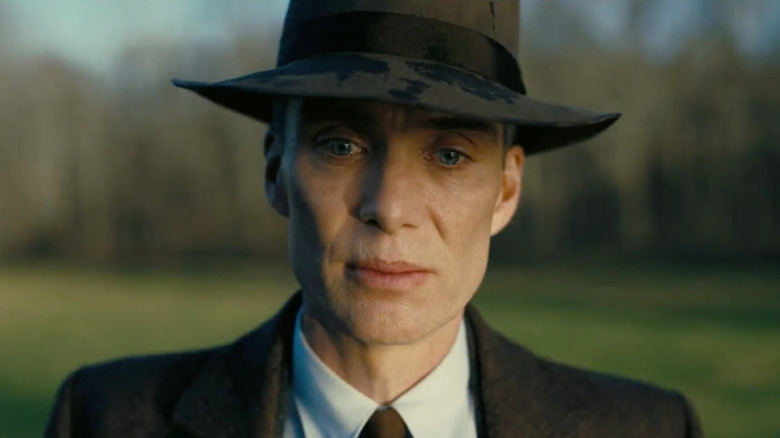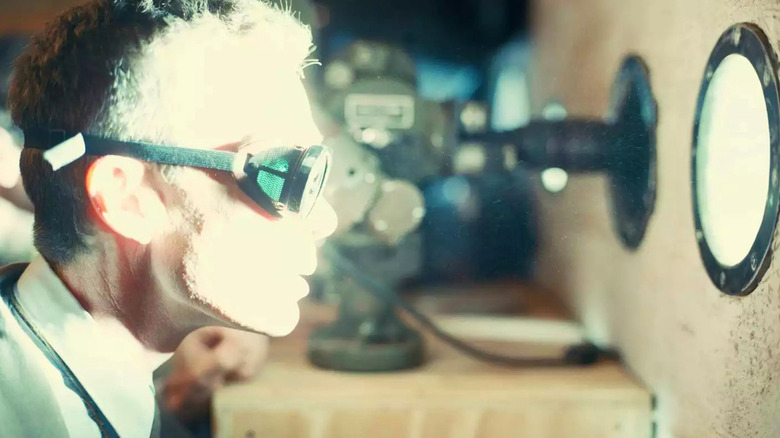Cillian Murphy Didn't Try To Understand Physics For Oppenheimer
If the Trinity Test was the most historic moment of the 20th century, surely the bombshell box office success that was "Barbenheimer" is the 21st-century equivalent. Ok, maybe not. But "Barbenheimer" did feel somewhat culturally historic in the way it captured our collective attention — and our money. Greta Gerwig's "Barbie" brought in an outrageous $162 million on its opening weekend while Christopher Nolan managed to hold his own with "Oppenheimer" making an impressive $82 million without the aid of brand recognition or existing IP.
Still, Nolan had the benefit of telling the story of a man the director has been on record as calling the most important figure in history. On July 16, 1945, J. Robert Oppenheimer and his team of physicists watched as their efforts to harness the power of Quantum physics lead to the first test of the most destructive weapon ever created. That famous Trinity Test was, as "Oppenheimer" shows, a major turning point not just in human history, but in the life of its creator, who following the bomb's use in Hiroshima and Nagasaki would spend the rest of his days grappling with the consequences of his work.
Reactions to seeing this story play out have been, as Nolan intended, varied. The filmmaker sees "Oppenheimer" as a kind of cinematic Rorschach test, whereby viewers see what they want to see in his adaptation of Kai Bird and Martin J. Sherwin's Oppenheimer biography, "American Prometheus." One thing audiences seem to be in agreement on, however, is that star Cillian Murphy did an outstanding job in the lead role, portraying the eponymous theoretical physicist with striking skill. And while the actor was clearly dedicated to delivering the best possible performance possible, he stopped short of actually trying to understand the physics that Oppenheimer dedicated his life to studying.
'My job is to go after the humanity'
Cillian Murphy was desperate to play the lead in a Christopher Nolan film, and finally got his wish with "Oppenheimer," after having worked with the esteemed director on five previous occasions. Murphy clearly didn't want to let Nolan down, either, spending his six months prep time doing as much research as he could. The actor also committed to matching the real Oppenheimer's slight frame, eating next to nothing to slim down. Such dedication paid off, with the final film being almost unanimously hailed as a triumph and /Film's Chris Evangelista proclaiming "Oppenheimer" to be one of the best movies of the year — none of which would have been possible without the commitment of Murphy.
With that said, there was one element of Oppenheimer's personality that Murphy didn't even try to emulate. As the 47-year-old told Vulture:
"I've played a physicist before, in a movie for Danny Boyle called 'Sunshine,' so I must have resting physicist face. What became clear to me really quickly was that there's no point in me trying to understand quantum mechanics. I don't have the intellectual capability. My job is to go after the humanity."
It seems Murphy is suggesting he briefly ventured into the world of quantum mechanics all the way back in the early 2000s when preparing to play physicist Robert Capa in Danny Boyle's 2007 sci-fi thriller. Alas, he was clearly very quickly deterred and despite his dogged commitment to doing Nolan proud in 2023, seemingly didn't even bother trying with physics when it came to prepping for "Oppenheimer."
You don't need to understand physics
While Cillian Murphy's performance is undeniably impressive, arguably the real star of "Oppenheimer" is how Christopher Nolan shoots Quantum physics. I remember being impressed with the filmmaker's depiction of the event horizon of a black hole in 2014's "Interstellar," and with the five-dimensional tesseract in which Matthew McConaughey's Cooper becomes trapped. It was striking how Nolan brought to life complex physics concepts in an accessible way. All of which is to say that the director clearly has an understanding of, and love for, physics, which is really all that's required for his films to give such visceral life to the science's abstract and complex ideas. That's something he achieved again with "Oppenheimer" and its captivating depictions of the titular scientist's inner visions of the quantum realm.
It also meant that Murphy didn't need to understand physics in order to convincingly portray J. Robert Oppenheimer, because the man actually grappling with its concepts and turning them into a workable script seemingly did. As physicist and Nobel laureate Richard Feynman is often quoted as saying: "If you think you understand quantum mechanics, you don't understand quantum mechanics." What Nolan has done with his latest film, and many of his previous efforts, has shown that you don't need to understand quantum theory in order to appreciate its enormity and be dazzled by its potential. Murphy, having worked with the director on numerous occasions, must have known he was in safe hands in that respect. Or maybe he really did just find the whole thing too confusing. Either way, aside from forcing us all to reflect on the folly of humankind and its seemingly unending pursuit of ever more destructive power, "Oppenheimer" has perhaps helped us, and hopefully Murphy, gain a little more understanding of quantum physics.


